Hyundai Mobis Bundle
Can Hyundai Mobis Drive the Future of Mobility?
Hyundai Mobis, a key player in the global automotive industry, is aggressively transforming itself to lead in the future of mobility. This strategic pivot towards autonomous driving and electrification is a bold move in a rapidly evolving market. Founded in 1977, the company has evolved from a domestic parts supplier to a global powerhouse, demonstrating remarkable adaptability and innovation.
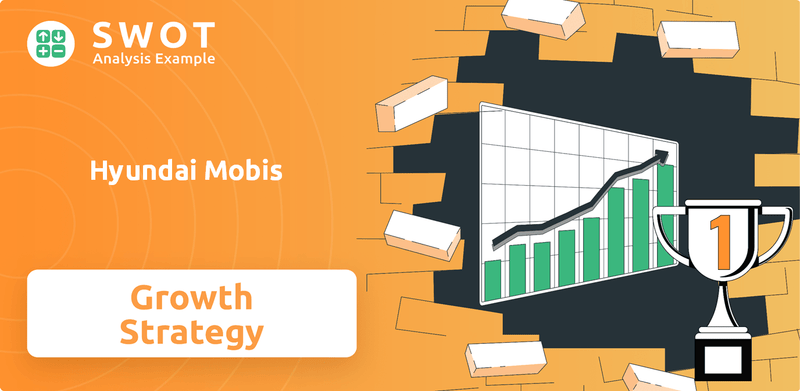
This article delves into the Hyundai Mobis SWOT Analysis, exploring its ambitious Growth Strategy and Future Prospects, including its expansion plans and technological innovations. We'll examine how this Automotive Supplier is navigating the challenges and opportunities presented by the rise of Mobility Solutions and its relationship with Hyundai Motor Group. Understanding Hyundai Mobis's trajectory is crucial for investors and industry watchers alike, given its pivotal role in the global automotive market.
How Is Hyundai Mobis Expanding Its Reach?
Hyundai Mobis, a key Automotive Supplier and part of the Hyundai Motor Group, is aggressively pursuing a Growth Strategy to solidify its position in the rapidly evolving automotive market. The company's future hinges on its ability to adapt and expand into new areas, particularly in the electric vehicle (EV) and autonomous driving sectors. This expansion is crucial for maintaining its competitive edge and driving long-term value.
The company's strategic initiatives focus on diversification, global expansion, and strategic partnerships. These efforts aim to enhance revenue streams, reduce dependence on internal sales, and capitalize on emerging opportunities within the Mobility Solutions landscape. Hyundai Mobis is positioning itself to meet the growing demands of both its parent company and external global automakers.
The company's strategic expansion plans are designed to secure its future growth. The core of this strategy involves entering new markets, broadening its product offerings, and forming strategic alliances. The primary goal is to enhance its revenue streams and reduce its reliance on sales within the Hyundai Motor Group.
Hyundai Mobis is heavily investing in electrification, focusing on battery systems and power electronics. This includes expanding production capacity for EV components. For instance, in 2024, the company announced plans to increase its EV component production in the U.S. to better serve its North American clients. This strategic move is vital for capturing a larger share of the growing EV market.
The company is expanding its global presence, particularly in North America and Europe. This involves establishing new production facilities and R&D centers to meet the increasing demand for EVs and advanced driver-assistance systems (ADAS). These expansions are designed to improve market access and customer service in key regions.
Hyundai Mobis is diversifying its product portfolio beyond traditional automotive modules. This includes integrated cockpit systems, next-generation infotainment, and advanced lighting solutions. The goal is to supply these components to both Hyundai Motor Group and other global automakers, thus broadening its customer base and revenue streams.
Strategic collaborations and joint ventures are central to Hyundai Mobis's expansion strategy. These partnerships allow the company to leverage external expertise and accelerate market penetration. By collaborating with other companies, Hyundai Mobis aims to enhance its technological capabilities and gain access to new markets.
These initiatives are designed to help Hyundai Mobis achieve significant growth in sales outside of the Hyundai Motor Group. The company is targeting a substantial increase in its order backlog from global automakers by 2025. This strategic approach is crucial for Hyundai Mobis to remain competitive and capitalize on the evolving demands of the automotive industry. The company's commitment to innovation and strategic partnerships is further detailed in Mission, Vision & Core Values of Hyundai Mobis.
Hyundai Mobis aims to increase its non-Hyundai Motor Group sales significantly, with a focus on securing substantial order backlogs from global automakers by 2025. The company is also focused on expanding its global footprint, particularly in North America and Europe, to better serve its clients and capture new market opportunities. These goals are supported by investments in new technologies and strategic partnerships.
- Increase non-Hyundai Motor Group sales.
- Expand production capacity for EV components in the U.S.
- Establish new R&D centers and production facilities globally.
- Secure strategic partnerships to enhance technological capabilities.
Hyundai Mobis SWOT Analysis
- Complete SWOT Breakdown
- Fully Customizable
- Editable in Excel & Word
- Professional Formatting
- Investor-Ready Format
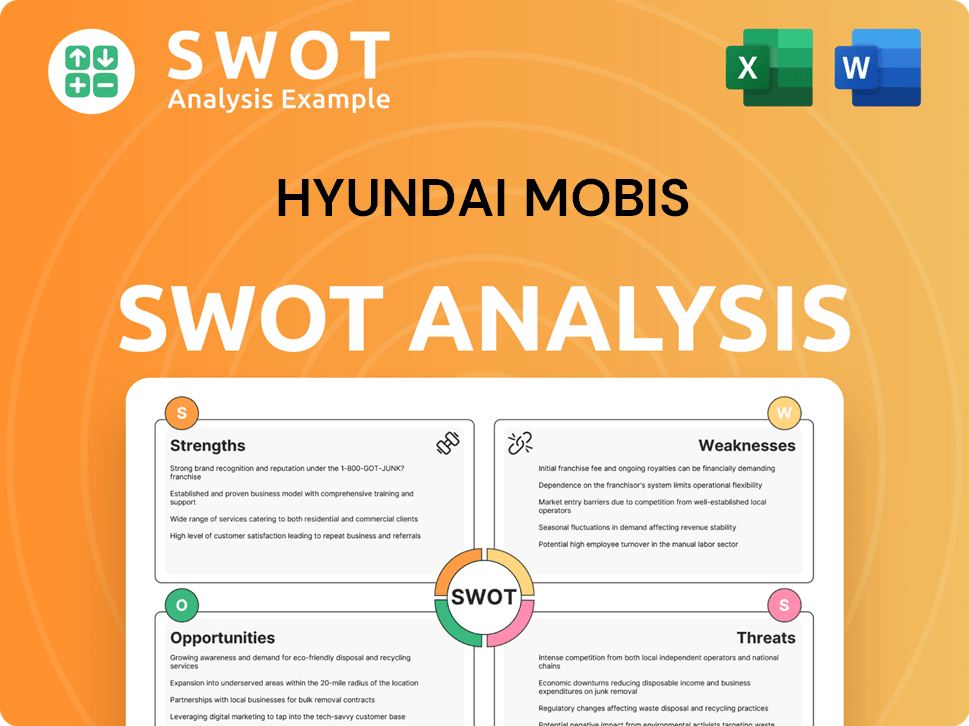
How Does Hyundai Mobis Invest in Innovation?
The innovation and technology strategy of Hyundai Mobis is a cornerstone of its growth strategy, focusing heavily on future mobility solutions. The company's commitment to research and development (R&D) is evident in its consistent investments, driving advancements in autonomous driving, electrification, and connectivity. This strategic focus positions Hyundai Mobis as a key player in the evolving automotive industry, particularly in the development of core components and technologies.
Hyundai Mobis is actively developing advanced driver-assistance systems (ADAS) and autonomous driving technologies, targeting Level 3 and Level 4 autonomy. This includes both in-house development efforts and strategic collaborations with technology firms and startups. This approach allows the company to leverage external expertise and accelerate the commercialization of its autonomous driving solutions, aligning with the industry's shift towards more automated vehicles.
The company's approach to digital transformation includes integrating AI and big data analytics into its manufacturing processes to boost efficiency and enhance product quality. This involves the development of next-generation electric vehicle components, such as integrated charging control units (ICCU) and battery system assemblies (BSA). Hyundai Mobis has secured numerous patents in these areas, demonstrating its leadership in innovation. For instance, its advancements in integrated modular platforms for EVs have garnered industry recognition, positioning the company as a key player in the global EV supply chain. Also, the company is committed to sustainable practices, including eco-friendly materials and energy-efficient production methods, which contribute to its long-term growth objectives by aligning with global environmental trends and regulations.
Hyundai Mobis allocates a significant portion of its revenue to R&D, reflecting its commitment to innovation. This investment is crucial for developing cutting-edge technologies in autonomous driving and electrification.
The company is focused on advancing autonomous driving capabilities, targeting Level 3 and Level 4 autonomy. This involves both internal development and strategic partnerships.
Hyundai Mobis is heavily invested in the development of EV components, such as ICCUs and BSAs. These components are vital for the performance and range of EVs.
The company integrates AI and big data analytics into its manufacturing processes. This boosts efficiency and improves product quality.
Hyundai Mobis focuses on sustainable practices, including eco-friendly materials and energy-efficient production. This aligns with global environmental trends.
Collaborations with technology firms and startups are key to accelerating innovation. These partnerships enhance the company's technological capabilities.
Hyundai Mobis's innovation strategy focuses on key areas to maintain its competitive edge and drive future growth. This includes significant investments in autonomous driving, electrification, and digital transformation.
- Autonomous Driving: Development of Level 3 and Level 4 autonomous driving technologies.
- Electrification: Focus on next-generation EV components such as ICCUs and BSAs.
- Digital Transformation: Integration of AI and big data analytics in manufacturing.
- Sustainability: Development of eco-friendly materials and energy-efficient production methods.
- Strategic Partnerships: Collaborations to accelerate innovation and commercialization.
Hyundai Mobis PESTLE Analysis
- Covers All 6 PESTLE Categories
- No Research Needed – Save Hours of Work
- Built by Experts, Trusted by Consultants
- Instant Download, Ready to Use
- 100% Editable, Fully Customizable
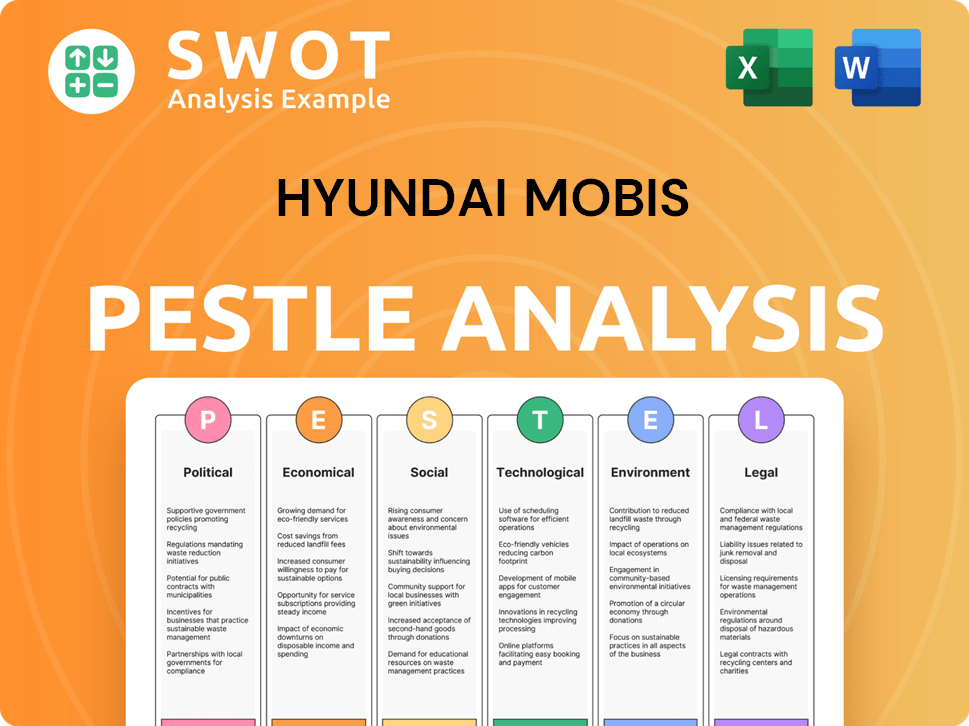
What Is Hyundai Mobis’s Growth Forecast?
The financial outlook for Hyundai Mobis is centered on continued growth, driven by its strategic pivot towards future mobility solutions. The company's revenue targets for both 2024 and 2025 reflect an ambitious trajectory, fueled by increasing orders for electrification and autonomous driving components. This positive outlook is supported by the company's focus on expanding its customer base beyond the Hyundai Motor Group, which is a key element of its growth strategy.
Hyundai Mobis's financial strategy emphasizes sustainable growth through technological leadership and market diversification. This approach is expected to solidify its position as a leading global mobility solutions provider. The company is making substantial investments in research and development (R&D) and new production facilities, indicating a commitment to long-term growth. This financial narrative highlights the company's commitment to innovation and expansion in the automotive supplier market.
The company's strong balance sheet and cash flow generation capabilities are expected to support its capital expenditure plans without significant external funding in the immediate future. This financial stability allows Hyundai Mobis to invest heavily in new technologies and expand its production capacity. The company's financial performance report consistently demonstrates growth and profitability, which is a key indicator of its success in the automotive industry.
Hyundai Mobis projects significant revenue growth, particularly in its module and core parts sales. The company is targeting increased sales from non-Hyundai Motor Group customers, which is a key element of its growth strategy. This diversification strategy is expected to drive substantial revenue increases in the coming years.
Analyst forecasts suggest a positive trend in profit margins for Hyundai Mobis, supported by enhanced operational efficiencies. The high-value nature of its new technology offerings is also contributing to improved profitability. These factors are expected to contribute to a strong financial performance.
Hyundai Mobis is making substantial investments in R&D and new production facilities. These investments signal a commitment to long-term growth and technological leadership. The company's focus on innovation is expected to drive future growth in the mobility solutions sector.
The company's strong balance sheet and cash flow generation capabilities are expected to support its capital expenditure plans. This financial stability allows Hyundai Mobis to invest in new technologies and expand its production capacity without relying heavily on external funding. This financial strength is crucial for its future prospects.
The company's commitment to innovation is evident in its investments in battery technology and autonomous driving systems. These investments are critical for maintaining a competitive edge in the evolving automotive market. For more insights into the company's financial structure, you can refer to Revenue Streams & Business Model of Hyundai Mobis.
Hyundai Mobis is actively diversifying its customer base to reduce its reliance on the Hyundai Motor Group. This strategy involves securing contracts with other major automotive manufacturers. This diversification is crucial for mitigating risks and ensuring sustainable growth.
The company is focusing on technological leadership in key areas such as electrification and autonomous driving. This focus allows Hyundai Mobis to offer cutting-edge solutions to its customers. This technological advancement is key to its future prospects.
Hyundai Mobis is investing heavily in battery technology and autonomous driving systems. These investments are designed to position the company at the forefront of the automotive industry. This investment strategy is essential for long-term success.
The company is focused on enhancing operational efficiencies to improve profit margins. This involves streamlining processes and reducing costs. This focus on efficiency is crucial for maintaining profitability.
Hyundai Mobis has a strong global market presence, with manufacturing facilities and sales offices worldwide. This global footprint allows the company to serve its customers effectively. This global reach is a key advantage.
The company is forming strategic partnerships to accelerate its growth in key areas. These partnerships provide access to new technologies and markets. These collaborations are essential for future growth.
Hyundai Mobis Business Model Canvas
- Complete 9-Block Business Model Canvas
- Effortlessly Communicate Your Business Strategy
- Investor-Ready BMC Format
- 100% Editable and Customizable
- Clear and Structured Layout
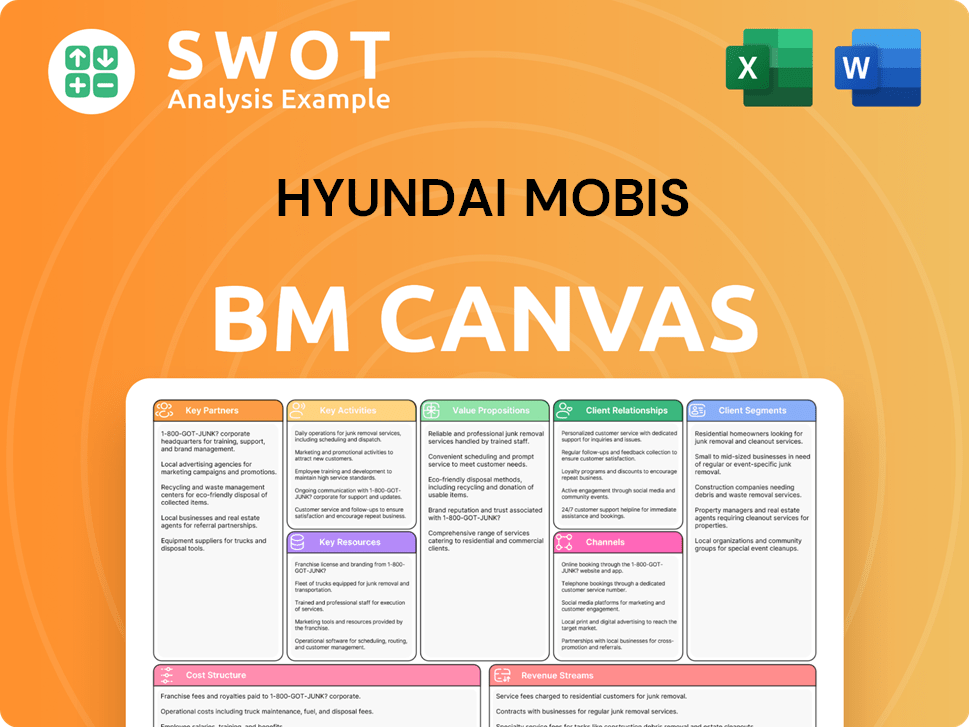
What Risks Could Slow Hyundai Mobis’s Growth?
The path forward for Hyundai Mobis, a key automotive supplier, is not without its challenges. Navigating the complex automotive market requires careful consideration of potential risks and obstacles. These factors could significantly impact the company's ability to achieve its growth strategy and realize its future prospects.
Intense competition, evolving regulations, and supply chain vulnerabilities are among the primary concerns. Furthermore, the rapid pace of technological advancements and internal resource constraints present additional hurdles. Addressing these issues proactively is crucial for Hyundai Mobis to maintain its competitive edge and ensure sustainable growth within the industry.
The automotive industry is highly competitive, with established players and emerging tech companies vying for market share. Competitors Landscape of Hyundai Mobis highlights the diverse range of rivals the company faces, including traditional automotive suppliers and new entrants in autonomous driving and electrification. This environment demands continuous innovation and strategic agility to stay ahead.
Hyundai Mobis faces stiff competition from both established automotive suppliers and new tech companies. The company must continually innovate to maintain its market position. This includes investing heavily in research and development to stay ahead of its competitors.
Changes in emissions standards, safety regulations, and trade policies can significantly impact Hyundai Mobis. Shifts in government incentives for electric vehicles (EVs) directly affect the demand for its electrification components. The company must adapt to these changes to maintain compliance and market access.
Supply chain disruptions, particularly for critical raw materials and semiconductors, pose a persistent risk. Hyundai Mobis mitigates this by diversifying its supplier base and implementing robust inventory management systems. These measures help to minimize the impact of potential disruptions.
Rapid advancements in battery technologies and the emergence of new mobility paradigms require constant adaptation. Hyundai Mobis must invest substantially in research and development to remain competitive. Strategic partnerships also play a crucial role in navigating these technological shifts.
Internal resource constraints, such as the availability of skilled talent, can hinder progress. Hyundai Mobis actively recruits top talent and invests in employee training programs. These efforts are essential to support its growth strategy and future prospects.
Emerging risks like geopolitical tensions and increased cybersecurity threats to connected vehicles could shape the future trajectory. Hyundai Mobis employs comprehensive risk management frameworks and scenario planning to assess and prepare for these potential obstacles. This proactive approach is critical.
In recent financial reports, Hyundai Mobis has demonstrated resilience, but faces continued pressure from rising raw material costs and supply chain issues. For instance, in Q1 2024, the company's operating profit decreased due to these factors. The company is actively managing these challenges through cost-saving measures and strategic sourcing.
Hyundai Mobis is investing heavily in electric vehicle (EV) components and autonomous driving technologies. The company plans to invest approximately $4 billion in R&D by 2026, focusing on these key areas. This strategic investment aims to capitalize on the growing demand for EVs and advanced automotive technologies.
Hyundai Mobis Porter's Five Forces Analysis
- Covers All 5 Competitive Forces in Detail
- Structured for Consultants, Students, and Founders
- 100% Editable in Microsoft Word & Excel
- Instant Digital Download – Use Immediately
- Compatible with Mac & PC – Fully Unlocked
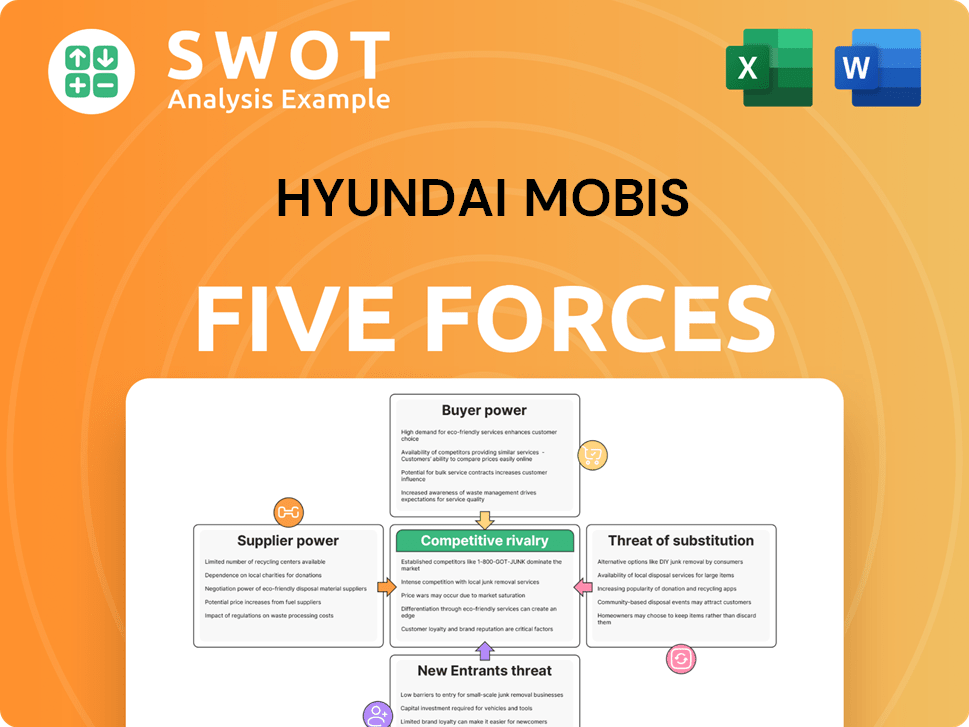
Related Blogs
- What are Mission Vision & Core Values of Hyundai Mobis Company?
- What is Competitive Landscape of Hyundai Mobis Company?
- How Does Hyundai Mobis Company Work?
- What is Sales and Marketing Strategy of Hyundai Mobis Company?
- What is Brief History of Hyundai Mobis Company?
- Who Owns Hyundai Mobis Company?
- What is Customer Demographics and Target Market of Hyundai Mobis Company?
Disclaimer
All information, articles, and product details provided on this website are for general informational and educational purposes only. We do not claim any ownership over, nor do we intend to infringe upon, any trademarks, copyrights, logos, brand names, or other intellectual property mentioned or depicted on this site. Such intellectual property remains the property of its respective owners, and any references here are made solely for identification or informational purposes, without implying any affiliation, endorsement, or partnership.
We make no representations or warranties, express or implied, regarding the accuracy, completeness, or suitability of any content or products presented. Nothing on this website should be construed as legal, tax, investment, financial, medical, or other professional advice. In addition, no part of this site—including articles or product references—constitutes a solicitation, recommendation, endorsement, advertisement, or offer to buy or sell any securities, franchises, or other financial instruments, particularly in jurisdictions where such activity would be unlawful.
All content is of a general nature and may not address the specific circumstances of any individual or entity. It is not a substitute for professional advice or services. Any actions you take based on the information provided here are strictly at your own risk. You accept full responsibility for any decisions or outcomes arising from your use of this website and agree to release us from any liability in connection with your use of, or reliance upon, the content or products found herein.